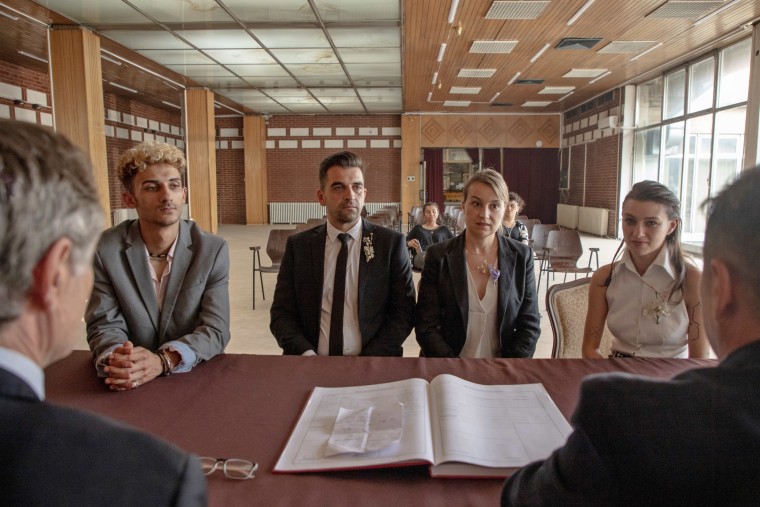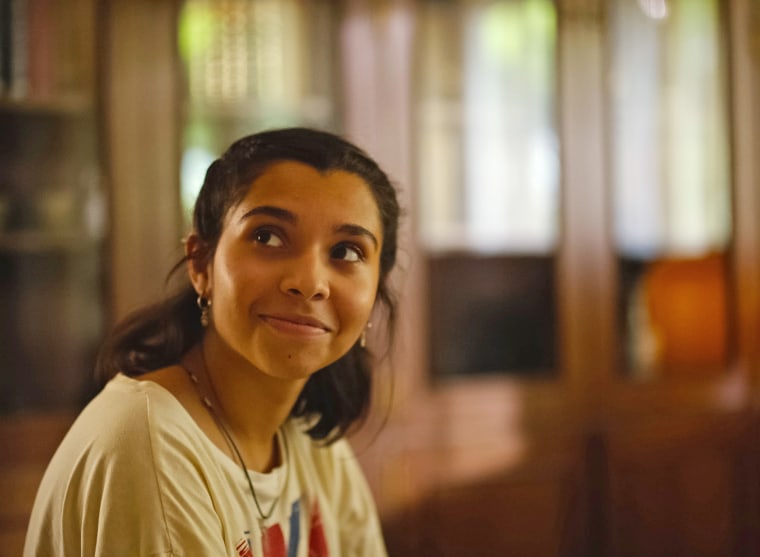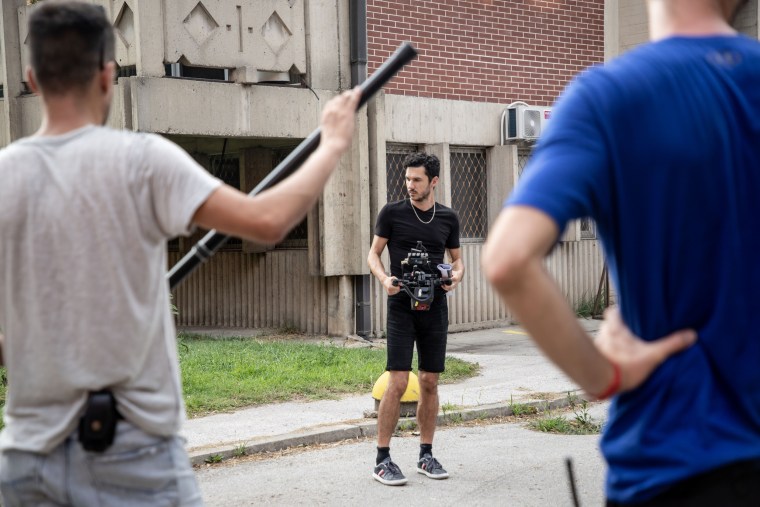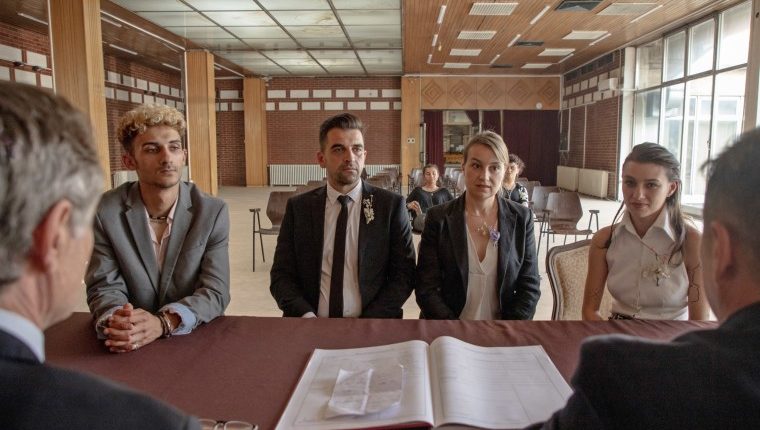The Macedonian-born filmmaker Goran Stolevski, whose previous features include 2022’s “You Won’t Be Alone” and “Of an Age,” has a talent for making heartbreaking films that contain just enough tragedy to turn a person inside out. His third feature, “Housekeeping for Beginners,” which follows a mostly queer “found family” of eight as it attempts to recover from the loss of the woman at the center of their world, certainly fits that bill.
Featuring a multigenerational cast of Eastern European actors, the ensemble film, which will be released in select theaters on Friday, was inspired by a photo from the 1970s taken by one of Stolevski’s friends just after he had moved to Melbourne, Australia, and into a house with his boyfriend and eight gay women.
“He posted this random snapshot from their day-to-day life, and I just remember looking at it and going, like, what a great space — a little cocoon where you can be relaxed and live your messy life on your own terms, in a time and place where that wasn’t possible for most queer people,” Stolevski told NBC News in an interview.

Stolevski then thought about transposing what he saw in that decades-old photo into a present-day context in North Macedonia, in southeast Europe just north of Greece.
“Macedonia is where I grew up, so it just felt natural, and also, Macedonia is a great stand-in for pretty much all of Eastern Europe and southern Europe,” the director, who moved to Australia as a teenager, said. “From a Western, Anglo-Saxon perspective, it’s this kind of exotic place, but, in reality, most queer lives in most countries today are shaped by a much more similar reality to what Macedonians are dealing with than to what we are.”
While the film opens on an upbeat note, with three of the family’s youngest members — Mia, 5; her sister, Vanessa, who’s about 13; and newcomer Ali, 19 — dancing around the living room to a Macedonian pop song, it quickly gives way to more sobering scenes.
The mom of the two young sisters, a fiery Roma woman named Suada, and her blond, laced-up partner, Dita, are seen going in and out of health clinics, looking for answers about the progression of Suada’s pancreatic cancer. It’s not long before Suada succumbs to illness, a loss that turns the entire household upside down and threatens their ability to continue living under one roof.

Vanesa flounders in the wake of her mother’s death, while Dita, who never aspired to be a parent, struggles to fill the void left behind. Dita’s best friend and housemate, Toni, and his lover, Ali (who is taken in by the cohabitating group after he and Toni have a one-night stand), are thrust into fatherhood roles while navigating their own complicated relationship. Collectively, the largely unrelated family — which also includes three queer women who look to be in their early 20s — must navigate harsh realities of the society they live in, in which sexuality, ethnic background and socioeconomic status are all potential reasons to take away someone’s rights.
But, amid the grief and frustrations that enter their lives, the band of eight finds moments of comfort in their unconventional household bursting with energy, chaos and lost souls looking for a soft place to land.
“The dynamic that emerged between the characters is this family dynamic that’s very similar to how I grew up, because I lived in a two bedroom apartment with six other people of three different generations — and that doesn’t count the 47 cousins that came in and out of the house every day,” Stolevski said. “There’s a warmth to me that comes from that time and a sense of belonging that I really crave and miss, and I think that’s the same kind of space that emerges in these overcrowded, found families.”
Echoing words Dita utters in the final scene as an olive branch to Vanesa, Stolevski added, “Ultimately, we’re all shaped by this universal impulse — this need — to live in a space with people who you can yell at but still feel loved by.”
Capturing the beauty of ‘found families’
To achieve his vision of a multiethnic, messy cocoon of found family and queerness, Stolevski embraced a more free-wheeling approach to filmmaking than he’s perhaps allowed himself to in the past. Alongside the more experienced cast members, he cast multiple first-time actors in lead roles, including Samson Selim (Ali) and his real-life daughter, Dzada (Mia). To help them tease out authentic portrayals — while still keeping his headstrong, 5-year-old star engaged — Stolevski said he nurtured an easygoing, exploratory environment during filming.
“It was a very free atmosphere on set, so they didn’t shut down and become mechanical, because film set processes can be dehumanizing to the best actors, quite frankly, and I’ve tried to minimize that as much as possible in all my films,” Stolevski said, describing the filming as “loose and documentary style,” capturing snippets of the actors interacting in the family space. “There was a chaotic energy that I loved, and I felt would be indicative of this massive, overcrowded household with a 5-year-old in the middle.”
Shooting in North Macedonia with first-time actors also brought plenty of challenges. To secure Selim for the role, Stolevski had to repeatedly pay the young man’s boss to hold his spot as a pizza delivery driver until after filming. And to secure filming locations, Stolevski had to lie about the portrayal of queer themes in the film — something that he initially thought would pose a roadblock to finding his youngest star.
“The reality is, in a country like Macedonia, making a film that involves gay people and children is complicated. Getting the permission of a family of a little girl from a conservative community to be in this film, it’s complicated,” Stolevski said. “When you say ‘gayness,’ people just picture dirty sex, and that doesn’t happen just in Macedonia — it’s everywhere.”
When it turned out that his top choice for Mia was Selim’s daughter, it was a no-brainer to cast her, according to the director. In addition to not having to convince her parents of his intentions, Stolevki found that Dzada’s natural chemistry with her father enhanced the believability of the film’s most heartfelt character, Ali, and drove home its central theme.
“He’s so good and so angelic, and for him to belong in that space organically, those girls needed to be obsessed with him, especially the little one,” Stolevski said of Ali, who forges a particularly deep bond with Mia and Vanesa in the wake of their mother’s death. “It’s key to what the theme is: that it’s not the roles you’re born into —you become a parent based on an innate thing that connects you.”
Documenting untold stories
As someone who’s built a family in Australia but remains deeply connected to his roots, Stolevski offers a unique viewpoint on what it’s like to live outside a handful of countries where gay rights aren’t, what he calls, “dire.” As he articulates in conversation and on film, the reality is that most queer people’s lives are defined by how they navigate the often contradictory obstacles their society places before them, in an effort to carve out a rich existence for themselves.
“A lot of times, we talk about these countries, like, ‘Oh, gay marriage is legalized in Slovenia,’ and every little bit of progress is wonderful, but that doesn’t quite describe what life is like day to day,” he said. “You still probably have to be closeted in your workspace, even if there’s anti-discrimination laws in place, and the policeman who will corner you while you’re running away from gay bashers might be there to protect you or might be there to join them.”

Stolevski noted that in many places, including his home country, “socioeconomics dictate how much you can get away with.”
“There’s often a bubble where you can live queer life semi-comfortably,” he said, citing his experience returning to North Macedonia as a recognized media figure. “But it’s just limited who gets access to that — severely, severely limited.”
Although it’s been decades since he shared a space with multiple generations of family members in Macedonia, Stolevski hasn’t lost his interest in telling stories about his home country, as he’s shown in each one of his features. In fact, he said, telling rich stories about Macedonia and other places that largely remain hidden from the screen is his singular goal.
“So many more lives resemble these ones, and there’s so much less documentation,” Stolevski said, contrasting his country of birth with a “safe, well-covered” storytelling space like Australia. “All these stories that are so vibrant and alive are going to go untold — there’s not going to be any record of what day-to-day life feels for these people; it’s going to be like they never existed — unless I capture it right now.”
For more from NBC Out, sign up for our weekly newsletter.
Source: | This article originally belongs to Nbcnews.com









